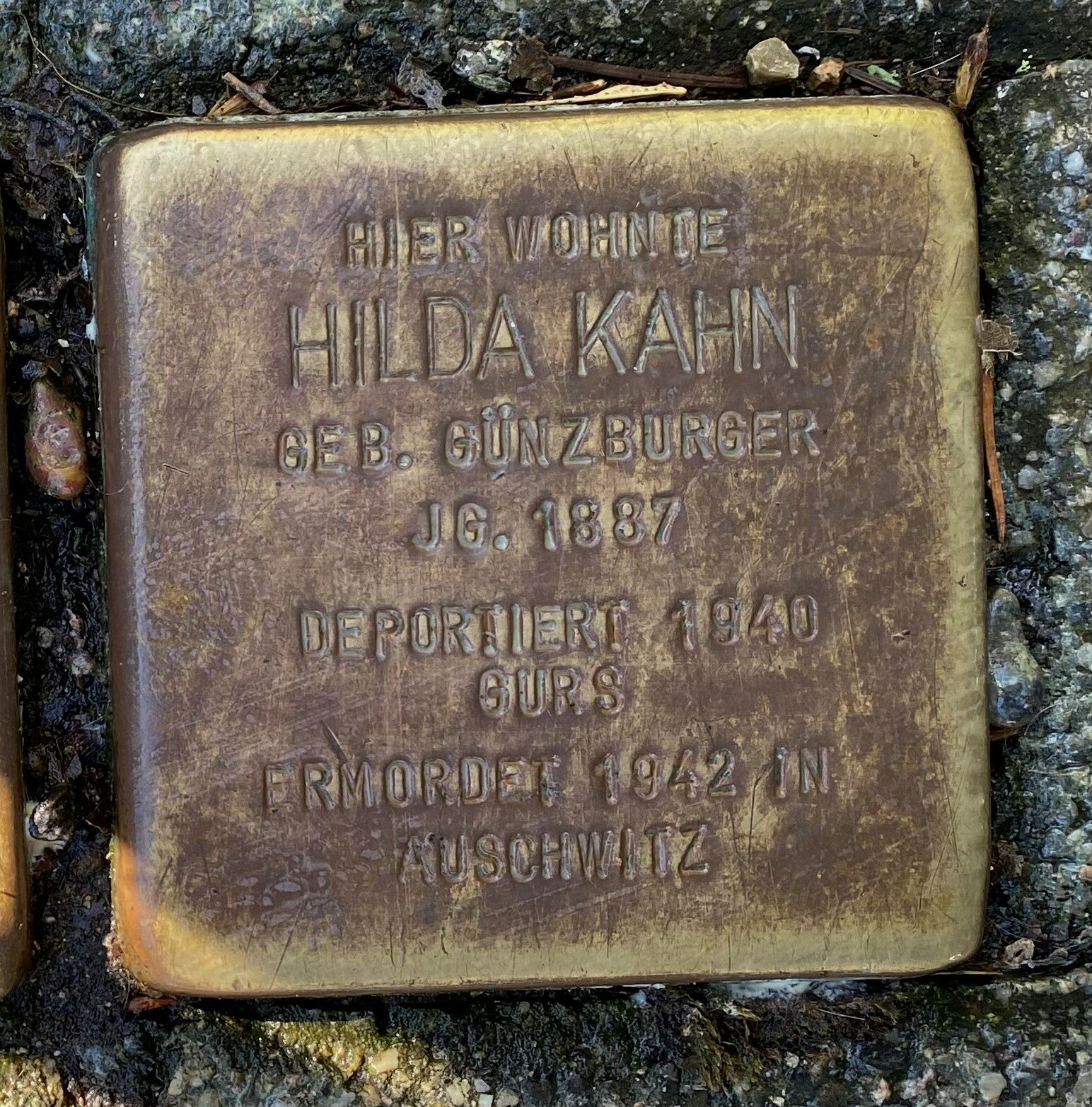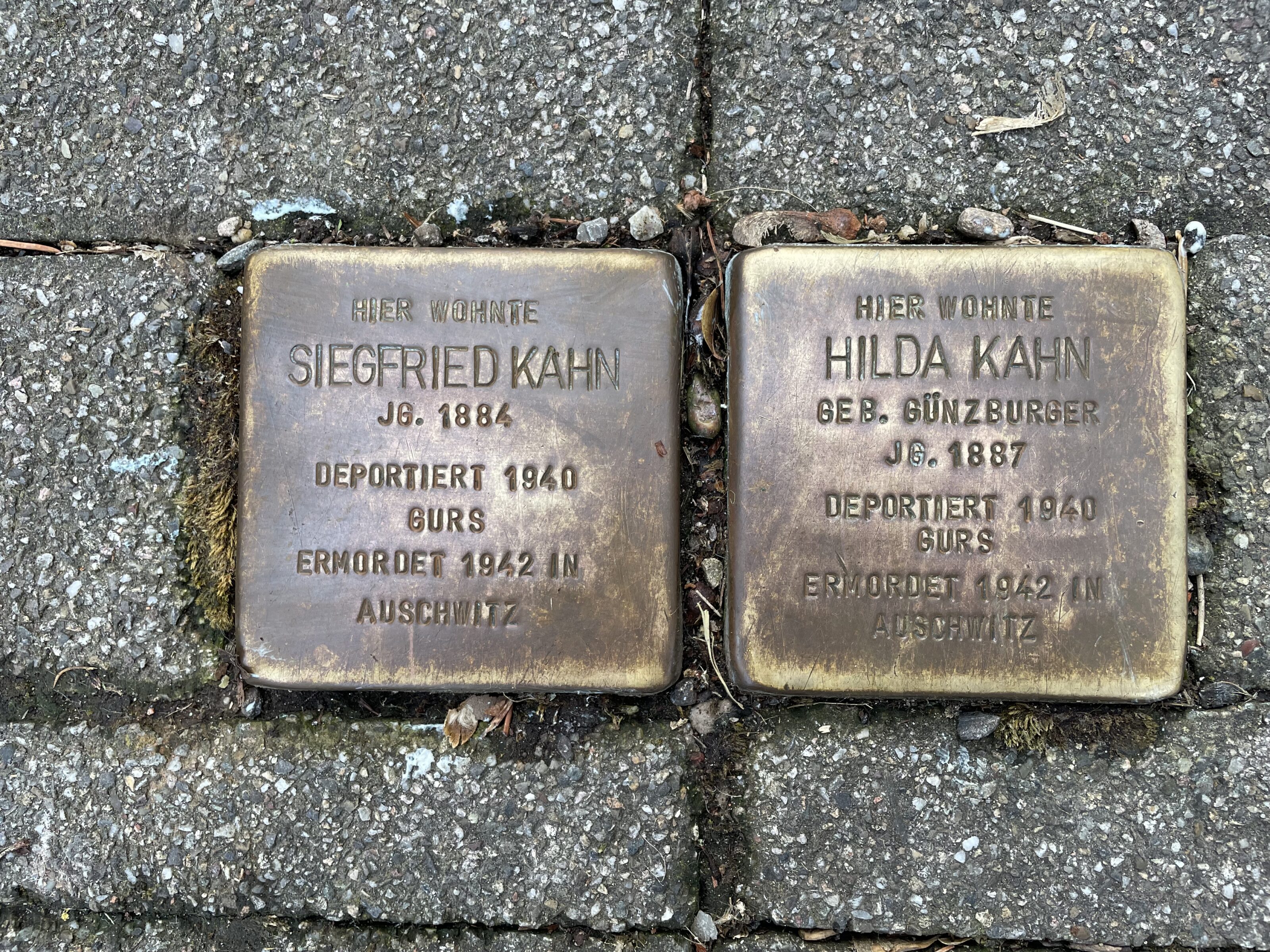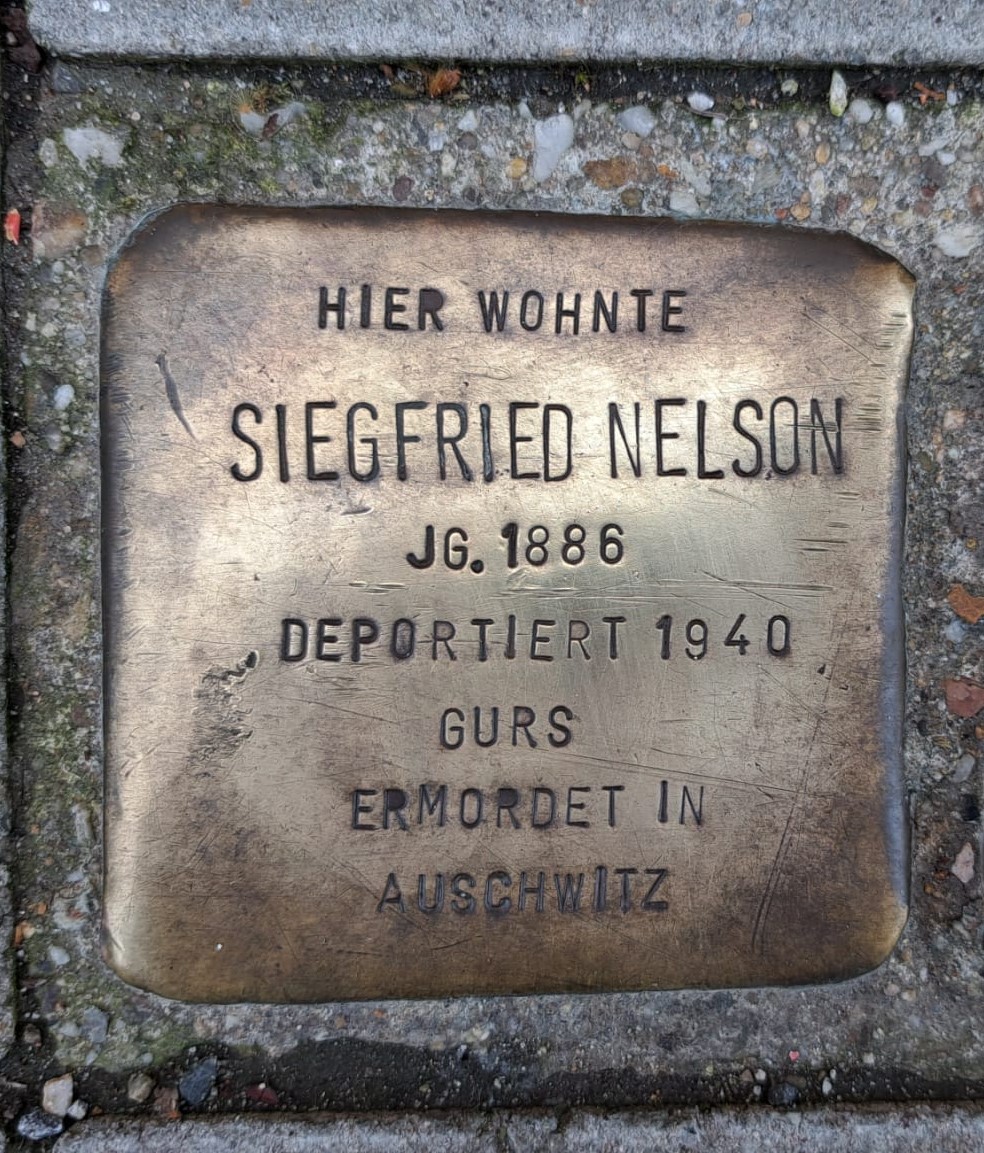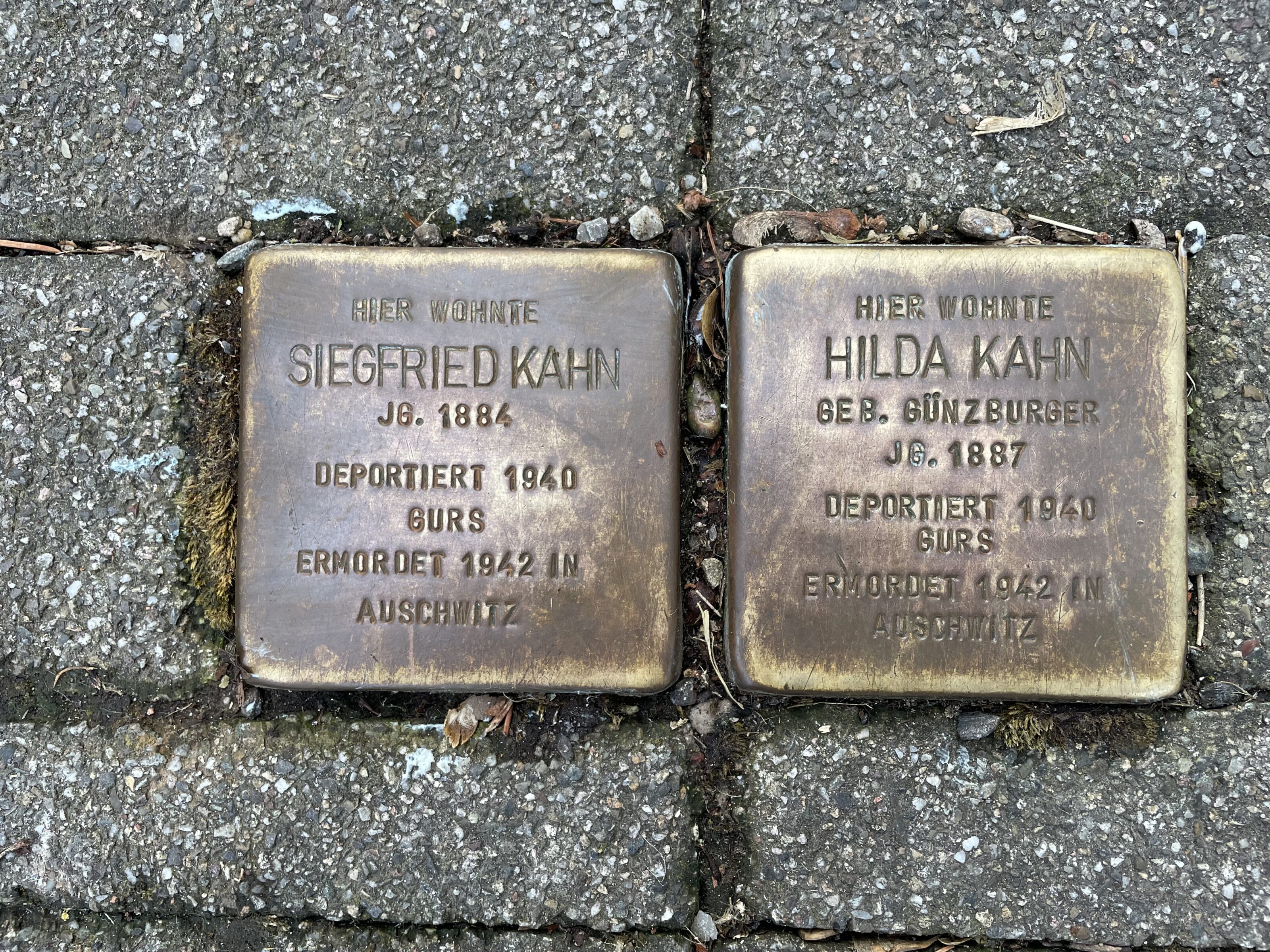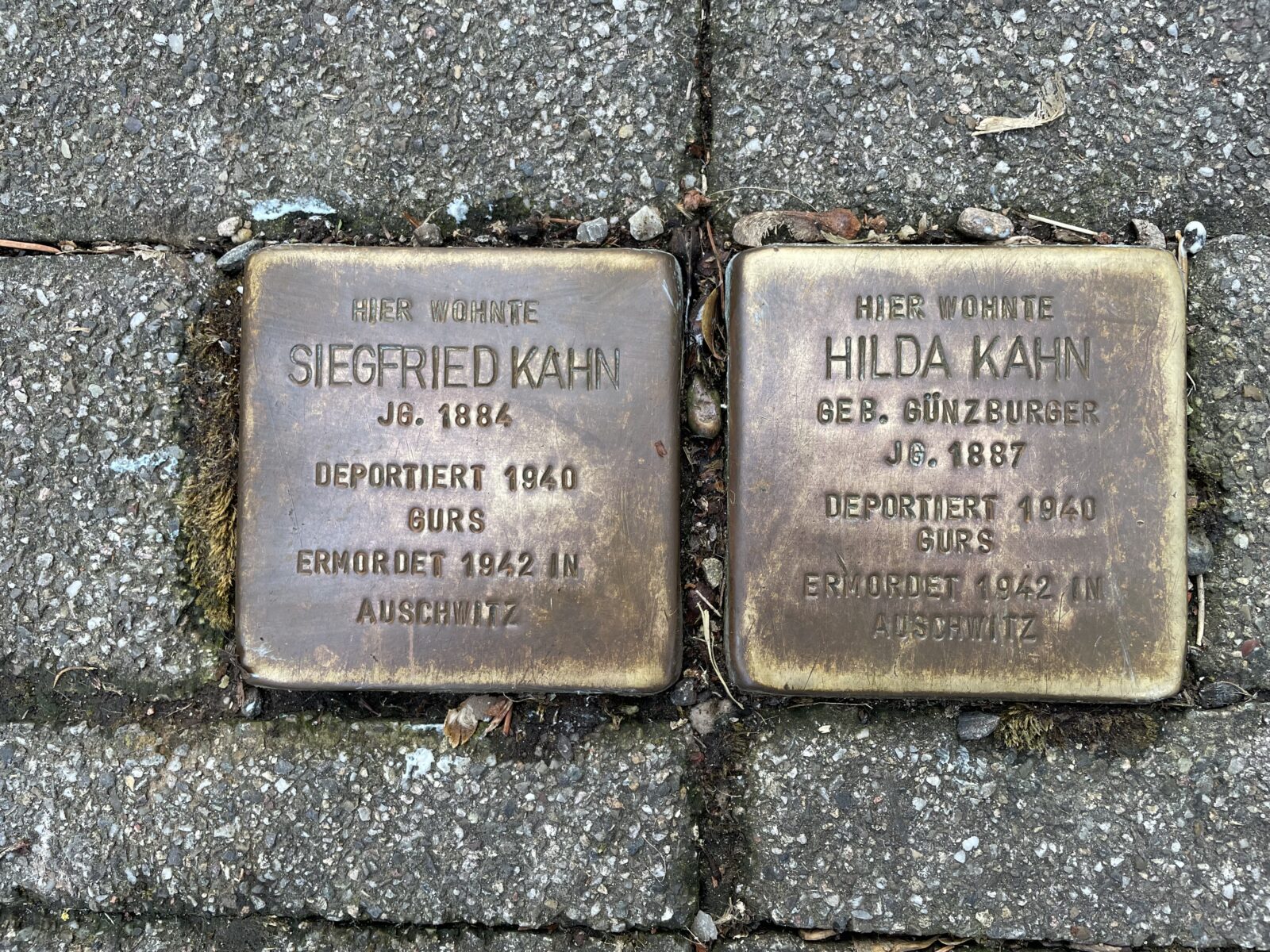
Hilda Kahn geb. Günzburger
HILDA KAHN (A) was born on July 30, 1887 in Müllheim as the child of Emanuel Günzburger and Karoline née Wachenheimer. She has two siblings: Heinrich and Hugo.
After secondary school, she completed a commercial apprenticeship in a textile store in Müllheim and then followed various professional opportunities in her hometown itself, in Karlsruhe and, finally, from 1910 in Basel. There she married the non-Jewish merchant Louis Albert Gatschet in 1915 and through this union acquired Swiss citizenship. Their son Albert was born on February 2nd, 1917. When he was 8 years old, his father died at an early age after a long-term illness. Now HILDA GATSCHET decides to return to Müllheim with Albert and to join the textile goods store opened in 1921 by her father (who was trained as a master tailor).
Business is off to a promising start. And when the widow decided to enter into a second marriage in 1928 with the Jewish merchant SIEGFRIED KAHN 337 , who also worked in the textile industry , nothing stood in the way of further professional expansion. HILDA KAHN now works as managing director in her father’s business, who continues to act as owner, while her husband travels to meet customers. So their professional future together begins hopefully at Hauptstrasse 111 in Müllheim, where they have rented their shop and apartment. The new marriage remains childless.
However, the ideal business location on Main Street soon turns out to be disastrous: since the Nazi takeover of power in 1933, it has been hopelessly exposed to all anti-Jewish smear campaigns – “Don’t buy from Jews” etc. In order to escape their rapidly deteriorating economic situation, KAHNs are forced to move to the less central Werderstrasse. But success was elusive: With the abandonment of this business in 1936 and with it all business activity at all, their only option was to move to the cheaper Gällelegässle on the outskirts of the city. The end of the business then means their financial ruin. The stately furnishings of the former four-room apartment and the business furniture from the early 1930s have long since had to be parted with.
Dazu kommen persönliche Trennungen und Schicksale. Die schweizerische Staatsbürgerschaft erfordert ab dem Jahre 1937 von Sohn Albert die Ableistung der Wehrpflicht in seinem Heimatland. Er wird sich in Müllheim nur noch besuchsweise aufhalten. Am 12.11.1938 muss SIEGFRIED KAHN die Verhaftung und Überführung in das KZ Dachau erleiden, von wo er viele Wochen später nur unter der Bedingung entlassen wird, schnellstmöglich aus Deutschland zu verschwinden. Auch für HILDA KAHN werden jetzt die bisher eher vagen Auswanderungsabsichten immer konkreter: Könnte durch die familiäre Bindung zu Sohn Albert nicht eine Flucht in die Schweiz als Rettung naheliegen?
In einem ersten Schritt in diese Richtung verlassen beide Eltern das feindliche Müllheim und ziehen am 02.08.1939 nach Freiburg, zuerst in die Rheinstraße 17 zur Familie Schlesinger, dann in die Breisacher Straße 17 zu Wertheimers. Umzugsbedingt aber auch in Hinblick auf eine jetzt endgültig geplante Emigration wird der größte Teil ihres bereits reduzierten Hausrats von der Firma Mengler gepackt und dort auch untergestellt.
Aber dieses Ansinnen wird brutal durchkreuzt. Am 22.10.1940 werden HILDA und SIEGFRIED KAHN verhaftet und mit mehr als 6.000 badischen und saarpfälzischen „Juden“ in das KZ-Lager Gurs deportiert. Von hier und von den weiteren Stationen ihres Leidensweges sind Briefe der Mutter an Sohn Albert auszugsweise in den Akten überliefert. Sie spiegeln im Lauf zweier Jahre den schmalen Grat zwischen dem anfänglichen Vertrauen auf Verbesserung ihrer verzweifelten Lage und der wachsenden Hoffnungslosigkeit angesichts der politischen Entwicklung.
- So am 28.10.1940, eine Woche nach der Ankunft in Gurs: „Vor allem bitte ich dich, fahre nach Bern und tue alles Mögliche, um eine Einreise für uns zu verlangen, wenn auch nur für kurze Zeit, dann schreibe einen Luftpostbrief oder telegraphiere an Onkel Hugo, daß er uns umgehend eine Bürgschaft senden soll, denn wer Papiere vorweisen kann, kommt am ehesten weg …“ Hier wird dringend um Hilfe gebeten, um die Schweiz (HILDA KAHN hat das Schweizer Bürgerrecht) und/oder die USA (Hugo als ihr Bruder ist dorthin emigriert) als Auswanderungsziel anzusteuern.
- Sodann 1 Jahr später Ende 1941 die Überstellung in ein kleines menschenfreundliches Lager in der Nähe Lyons: „Kann dir nun mitteilen, daß wir Gottlob gestern Mittag wohlbehalten hier angekommen sind…“
Es ist die Maison de la Roche in Chansaye-par-Poule: eine Zwischenstation zwar, aber keine aussichtsreiche Basis für die dauerhafte Rettung in Form einer Emigration.
- A year later, on September 17, 1942, from the Center d‘ Hébergement Rivesaltes near Perpignan, Albert received more desperate news: “We have been away from Chansaye since Monday morning and will now share the same fate with many of our fellow victims. May God protect us all and give us all a happy reunion. Stay healthy my child, be calm even if you don’t hear from us for a long time; at R. Kahn, Lyon, Avenue Lacaragne 34, we have the large suitcase full of clothes that you are aware of. Good luck my child, warm kisses to your mother” .
- And a day later in great hopelessness: “Fais tout possible pour obtenir visa d’entrée pour nous stop. Seul espoir, réponds par télégramme que visa est envoyé”. (“Do everything possible to get entry visas for us… The only hope is to reply by telegram that the visas have been sent”).
- The two-year correspondence between mother and son ends with the last postcard, posted on September 30, 1942, the day of their arrival at the Drancy concentration camp : “My dear, we both arrived here safely and are healthy, I hope you are also in the best of health. Farewell, good luck and blessings.”
On November 4, 1942, HILDA KAHN and her husband were deported from the Drancy concentration camp to the Auschwitz-Birkenau murder camp. Both are presumably murdered in the gas chambers immediately after their arrival.
On July 20, 1959, the Freiburg district court declared November 15, 1942 as the date of HILDA KAHN’s death. She is 55 years old.
Sources: Freiburg State Archives, F 196/1 – 11510, 5888. For secondary sources see SIEGFRIED KAHN 337.
Research and text: PK STOLPERSTEINE project in FREIBURG

